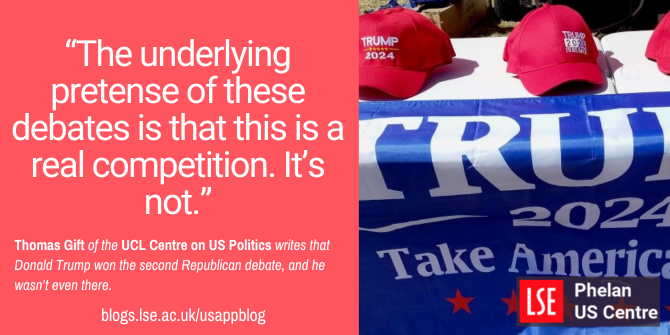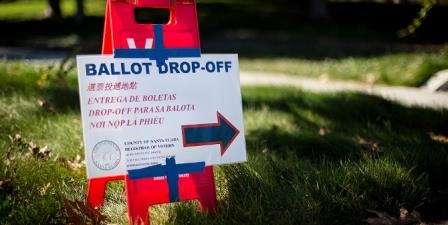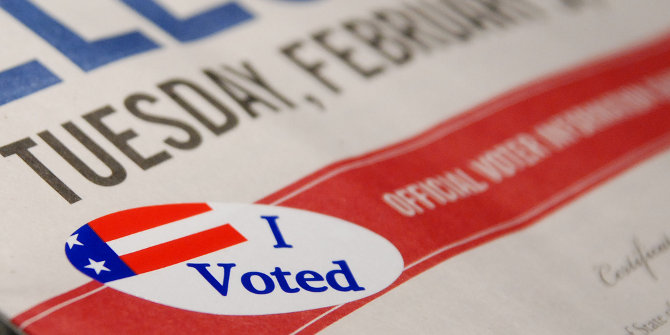 Republican candidates squared off for the second presidential debate last night, with Donald Trump again not in attendance. Who came out ahead, and how might to affect the Republican primary race going forward? In this Q&A, Thomas Gift explains.
Republican candidates squared off for the second presidential debate last night, with Donald Trump again not in attendance. Who came out ahead, and how might to affect the Republican primary race going forward? In this Q&A, Thomas Gift explains.
Who won last night’s debate?
Former President Donald Trump was the big winner because nothing disturbed his frontrunner status. And nothing happened that would make him second-guess his decision to bow out of future debates. In the end, that’s all that matters. Admittedly, though, it’s so hard to parse winners and losers like this is a typical debate. Because it’s not a typical debate. The guy who’s dominating the polls isn’t there. Most of Trump’s rivals, save former New Jersey Governor Chris Christie and, to a lesser extent, Florida Governor, Ron DeSantis, are pretending like he doesn’t exist. Usually, we can assume that candidates are at least trying to take out the leader. But Trump’s Achilles heel is the legal trouble he faces — and the word “indictment” came up, to my count, one-time last night. So, the debate felt largely like a diversion. There was more shouting, and more psychodramas, among the candidates than during the first debate. But it’s hard to see it budging the polls.

“Trump 2024 ”Take America Back” flags & p” (CC BY-NC-ND 2.0) by Gilbert Mercier
Do these debates even matter then?
It’s hard to watch these debates, and not think of them as peripheral, bordering on irrelevant. They’re pro forma. They may determine the second-place candidate, or Trump’s vice-presidential pick. But Trump is up some 40 percentage points. The underlying pretense of these debates is that this is a real competition. It’s not. And by refusing to show up, Trump is just reinforcing his main message, which is: this is a coronation, not a primary. Trump’s entire candidacy is built around an air of inevitability. The idea is that his nomination is pre-ordained. It’s a self-fulfilling prophecy. And so far, that seems right. It’s impossible to look at the data and make any other projection. Plus, the fact that Trump is running so close to Biden in national polls basically defies the “unelectability” argument that many of the other candidates had been making against him.
Are any candidates going to drop out?
What these debates don’t seem to be doing is clearing the field. And the only way Trump is going to face a real primary is if he’s forced to go head-to-head with a single opponent. That means other candidates are going to have to drop out—and soon — either in the coming weeks, or right after Iowa and New Hampshire early next year. For now, this is really the “Trump vs. everyone else” primary. It’s a big, fractured field. Everyone else is splitting the anti-Trump vote. And in winner-take-all, or even proportional primaries, Trump can essentially amass all the delegates with that formula. Currently, Trump has about 55 percent of the party’s vote. Another candidate could conceivably challenge him, but there’s a collective action problem: Dropping out is good for the broader effort to challenge Trump. But it’s not good for the candidates individually. And no one wants to be the sacrificial lamb.
Does anyone have a shot at all?
To my mind, Ron DeSantis still looks like the main Trump alternative, although there’s no doubt he’s stuck in neutral. But besides DeSantis, just go up and down the line, and I think it’s hard to see anyone else making a serious run. Former North Carolina Governor, Nikki Haley, is basically a clone of Trump in terms of policy, as is South Carolina Senator, Tim Scott. Both seem like they’re vying for VP or cabinet slots. Vivek Ramaswamy said he wants to take the America First agenda “much further” than Trump. Former Vice President Mike Pence basically spent four years before January 6th defending everything Trump did. Chris Christie is the outlier, but it’s hard to see him making inroads in a party that’s so completely Trumpified. So, for DeSantis, the hope must be to have a respectable showing in the Iowa caucuses in January next year, doing well enough to gain some traction into New Hampshire. And pray that’s enough to energize his campaign and to reassure donors that he’s not out of the game.
- These remarks are based in part on interviews by Thomas Gift for CNN “Newsroom” and CNBC Street Signs on September 28, 2023.
- Please read our comments policy before commenting.
- Note: This article gives the views of the author, and not the position of USAPP – American Politics and Policy, nor the London School of Economics.
- Shortened URL for this post: https://bit.ly/3Pxc1fb






